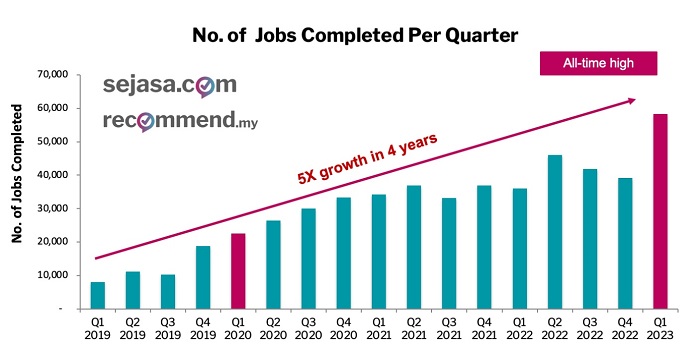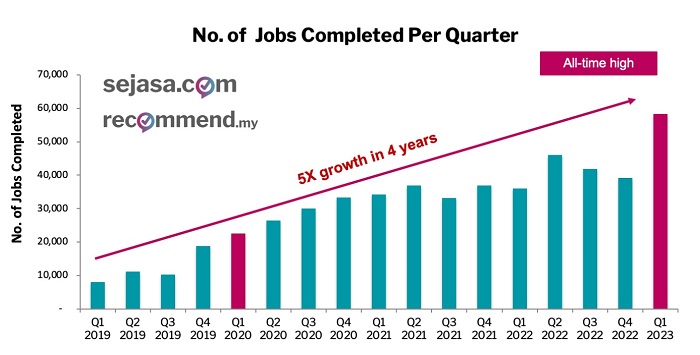- If mission is noble, product useful (and you’re not a horrible person), people will help
- Stop obsessing over competitors, losing sleep when they raise $, focus on your journey
They say cats have nine lives. They explore, climb high things, fall frequently, but somehow always manage to land on their feet, and continue to climb to greater heights to find bigger fish.
Entrepreneurship is often like that, especially for tech startups.
Our journey building Recommend Group (formed in June 2014, exactly 9 years ago), has been like that too.
How did it begin? At the risk of sounding cliche, at my kitchen table. My co-founder Alex Tan and I, sketching ideas on paper and going through the usual first-time founder ideas – Grab but different, Facebook but different, LinkedIn but different, etc.
And then we asked ourselves – what is the biggest, most annoying problem that we’ve faced lately? Me, having just completed a home that took 10 long years to build (it’s a long story and DNA won’t give me the space to vent!). And him, just being ‘scalded’ by the price his water heater guy hit him with.
So we looked at each other and could read the other’s mind – build a home services platform! One that made it as easy as Grab to order a plumber and any other service person required for some services.
The nine year rollercoaster ride
It’s been a nine-year rollercoaster ride, and we’ve been flung high and dipped really, really low on this crazy journey. It’s changed our lives though, in many ways.
Here are the top 9 things that we’ve learnt.
- There is no perfect time to start
- Get the ball rolling
- Do unscalable things, but not for long
- Be careful who you get in bed with
- Who would you be stranded with on a deserted island?
- Worry about your competitors, but not too much
- What does success mean to you?
- The rollercoaster keeps rolling
- It’s all worth it
- There is no perfect time to start
People always ask me “When is the perfect time to start a business? Before or after marrying? Before or after kids? What if I don’t have the perfect idea, the perfect team, the perfect partnership?”
I used to obsess with only starting when all my ducks are in a row. Until I met Grab co-founder Anthony Tan in early 2014, who advised, “Don’t wait for the perfect market, condition, team, product, etc. to launch. It will be too late. There will never be a perfect situation. Launch first with whatever you have, and then be flexible and tweak the business on the way.” And so we launched.
Having said that though, I would caution that the one thing you DO need to prepare is a “safety net”. It could be between 6-12 months of savings, family members who are willing to support you, or a wife who is understanding enough to eat ramen everyday and not demand Prada bags for the next 10 years.
And also, women founders – we have a fairly short “window” to start a family. Whereas you can still start a company at 62 (like Colonel Sanders) and still succeed. So, if you want to have 6 kids, you have to plan a bit and start earlier.
So when is the perfect time to start a business? When you have found a clear problem you want to solve, you’re excited about it, you have some of the key skills needed to solve it, and you have a nice safety net. And then jump!
- Get the ball rolling
In many business models you face a cold-start problem. For ours, it was a marketplace. No vendors = no customers = no vendors. You always need to provide some value first, attract some initial interest, learn from that, tweak your product / go-to-market strategy / marketing and then attract more interest, get some good testimonials, and then rinse and repeat.
When we needed a list of the top 20 good-quality renovators, plumbers, electricians, etc. in Malaysia to start, we approached our friends. We asked them to recommend the best guys in their phone book, and in return we will send them the full list compiled from all our other friends. This way, we ended up attracting many customers with serious need for good service professionals, and we on-boarded hundreds of good-quality service professionals with reviews from people we could trust. And that got the ball rolling! That process took only 1 month, but it certainly got the ball rolling!
What we learned was – if your mission is noble, and your product is seen to be useful (and you’re not a horrible person), people around you WILL help you. Solve the cold-start problem with warm friends. If the “target customers” amongst your friends don’t seem to care much about your product, then maybe you don’t have a real “use case”.
- Do unscalable things, but not for long
When we were a 3 person team (hello, super-intern Lydia), we did everything manually. We scraped databases, created business profiles and then called service professionals to on-board them. It was time-consuming and tiring, but speaking directly to service professionals gave us a good idea of what they really really needed. We couldn’t do that forever though, it would have been a mental health risk. We only did that for the first 6 months though, any longer and I would have gone mental.
When we built our product, we created a process to automatically blast jobs to service professionals in that area, even though they weren’t registered yet. They could then access our system, upload their documentation, read the training documents and go through the test before we even manually interviewed them. In that way, we removed all the “low intent” or “low quality” service professionals and only dealt with the ones who were likely to join our platform and perform really well.

- Be careful who you get in bed with
I don’t mean your Friday night companion(s). I mean your investors.
Angel investors, VCs, venture debt, grant providers. Smart money is good, but what is worse is not “dumb money” – it’s “time-wasting money”.
Investors who will distract you with random suggestions like “You should create an NFT of your top selling interior designs.” Or “Create a crypto-wallet and make your plumbers accept Ethereum instead of Ringgit.” They could end up being good ideas, but you know what I mean.
Grants are never free – they usually have high accountability requirements, and therefore you will probably have to spend your money first and then claim it back months later. You will find yourself totalling up piles of receipts every month, and creating reports that track your revenue, operational KPIs, how many carbon credits you generated and how many females / minorities you have hired. All these are good things, but these are probably one of the reasons why you left your corporate job.
So yes, do your due diligence on your investors. Speak to their other investees (take them out for coffee, they will never write anything over Whatsapp), and get them to spill the beans.
And please, please, please – get a lawyer to review your term sheet, subscription and shareholder agreement. If you see the terms 2X liquidation preference, put / buyback option, redemption clause, high interest rates, warrants with high coverage, run for the hills.
- Who would you be stranded with on a deserted island?
Imagine you needed to pick 5 people to be with you on a deserted island – what characteristics would you prioritise?
Your first few hires make a HUGE amount of impact to your momentum. It is their skills, drive and passion that propels you from zero to one and most importantly, set the culture for the next 20 hires. They should propagate and multiply your energy, moving from milestone to milestone. They should be excited about solving challenges, and their excitement should make YOU even more excited.
We’ve gone through great times as a company. We’ve successfully raised funds over a few rounds; won some national awards; and been featured by global media. We’ve become the largest player in all our countries, in some cases outlasting many of our competitors.
We’ve gone through very difficult times as a company. Since the pandemic we have removed business models, reduced salaries temporarily, and even right-sized the team. These are very tough decisions that impacted our team and their families greatly, and certainly posed challenges to team morale.
The thing that kept me going, is the team. In some of the most difficult moments, I remember my core team saying to me “Jes, we understand what you’re saying. We know why you guys had to make this decision, and we know you did everything in your power to make this right for us.” Humbling and deeply moving for us.
We have had many staff who left us but came back again with new skills in new roles. We are probably the only company on earth to rehire people we unfortunately had to let go. It wasn’t their fault, it was our poor planning, so in better times when we had an opening, we welcomed them back in again.
- Worry about your competitors, but not too much
In our early days, I was obsessed about our competitors. I would download their product, study every flow, furiously snapshot and send them to my team to “learn” (e.g. copy). I would book their services and interview their service professionals. That enabled me to learn about them and figure out how to be better.
But along the way, our strategies changed. We would choose to prioritise customer service and service professional relationships, while they prioritised something else (for example, excellent UI/UX design). So naturally, their product would be prettier, but when I kept snapshotting (I became very good at this) the UI/UX for the team to compare, it would demotivate my side.
And so, for us, what would have been better was if we spent more time talking to our customers and service professionals, and our front-line staff who dealt with them directly. That would have enabled us to learn and iterate faster, while staying true to our vision and differentiation rather than straddling different paths all the time.
What we learnt was that if you choose your market well, it WILL be big enough to take a few competitors. So you’re not really competing with other startups, you’re competing against the status quo, against the grey market, against no one caring about your existence. So stop obsessing over them and losing sleep every time they raised money (which in our case, was VERY often so I lost a lot of sleep these nine years), focus on YOUR journey.
(Please remind me of this point the next time my competitor raises funding and I start getting emo on social media)
- Define what success means to you
People start businesses for different reasons. Some because they hate their old bosses, some to prove a point, some to get rich, some to make this world a better place. This goal defines your business, and will push you through the thick and thin, so think carefully about what this might be.
In our early days, we thought being “big” was everything. So we defined success by the number of leads, number of service professionals on our platform. We spent a lot of time building our performance marketing funnel, delivering that 3% more volume every month, and it consumed a lot of our headspace.
It was many years later when we realised what truly delivered value to our customers and service professionals was “job successfully done” and “satisfaction score”. Because when a job is done, a customer gets to put a check-mark beside that task and his wife can stop nagging him. When a job is done, a service professional takes home enough to put food on the table for that day.
Realising that completely changed our focus and our business model improved so much, that whether the volume rose in holiday periods or dipped down in pandemic periods, our “jobs successfully done” and “revenue” metric grew every single year.


- The rollercoaster keeps rolling
Ask any entrepreneur, and he / she will say the journey is full of ups and downs. The “ups” of achieving a key milestone or a successful fund-raise or a key hire, is fast followed by the “downs” of a competitor fund-raise or a key person leaving or more devastatingly, then Prime Minister Tan Muhyiddin Yassin announcing yet another MCO (this one gives me PTSD until today. My palm starts sweating the moment I see his face).
A key partnership that you closed could be the one that generates a lot of headache for your team. A key investor that agreed to sign could be the same guy who is voting against you in a board meeting at some point.
The elation of success doesn’t last long, and the emotional dips when something undesired happens doesn’t last either. It becomes “yet another thing” in the journey of entrepreneurship.
Take the unicorns, for instance. They are kings of the world when they raise funds, but then the pressure is on to grow and not to make any obvious mistakes. They are queens of tech when they IPO, but when the tech winter set in, their share price probably gives them a heart attack every morning.
But the thing that keeps you going, is the gradual achievement of whatever vision or goal that you set out for the company and yourself. Keep your eye on that goal and everything should fade away.
- It’s absolutely worth it
Some people (usually the friends from my corporate life, who are still in their cushy job and holidaying in Southern Italy) ask me “So, is it worth it?”
Honestly, I usually have to think. Back in my old life, I never checked food prices before ordering. My flight seats could recline. The hotel staff greeted me with “Good morning Ms Lua, your suit has been pressed by housekeeping,” when I checked into my 5-star hotel.
Now, I do intermittent fasting to save time and money. My flight seats on AirAsia are concave. My clothes are fashionably wrinkly. And I regularly ask my AirBnB host for extra toilet paper and water.
But everyday when I wake up, I know that we will be working on something that makes life better for people. We will be helping people build and maintain the home of their dreams. We will be helping service professionals put food on the table for their families. We will be helping immigrants create a better life in a new country.
What we, at Recommend Group do, makes a difference.
And no amount of freshly-pressed shirts can replace that.
[Ed Note: Recommend has launched a ECF campaign at pitchin.]
%20Alex%20Tan%2C%20Jes%20Min%20Lua%2C%20and%20Anthony%20Eka%20Wijaya.jpg)


